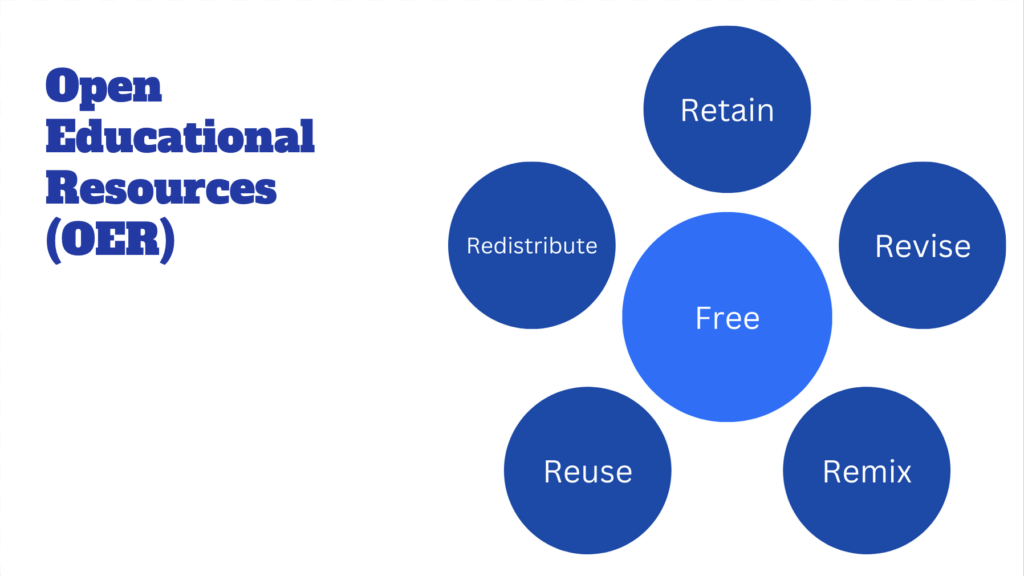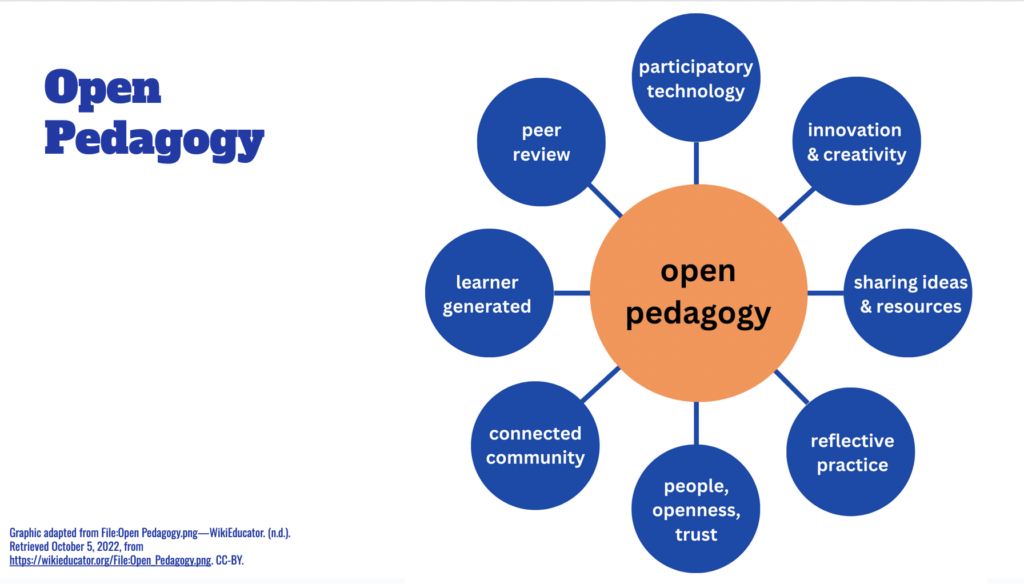
About this Module
Learning Objectives
- Discover the intersection of UDL and Open Educational Practices (OEP)
- Evaluate course content from a UDL perspective
Activities
- Review the CAST webpage on UDL and Assessment
- Watch our video exploring the overlap of UDL and Open Educational Practices
- Explore one open assessment
- Reflect on your course’s major assessments using the Open UDL Planning Tool
- Discuss your thoughts by sharing and responding to others on the discussion board
Module Summary
In Module 2, UDL and OEP Assessment Practices, we’ll investigate the substantial overlap of the principles of UDL and Open Educational Practices—particularly the eight attributes of Open Pedagogy and the “5Rs” of Open Educational Resources. In keeping with the best practice of backward design, we’ll think specifically about how the principles of UDL and OEP can reduce barriers in our assessment practices.
For this investigation, you’ll extend your Module 1 look at UDL by reading CAST’s webpage on UDL and Assessment. Then you’ll watch a video to learn more about Open Pedagogy and OER and how the principles of each support (and are supported by) UDL. After that, you’ll choose one of a host of OER/Open Pedagogy assessments to explore, to get a sense of how open assessments can reduce barriers for students. Hopefully, these materials will give you fresh eyes with which to review the high-stakes assessments in your course as you complete the Assessments section of the UDL and OEP Planning Tool. As a group, we’ll share insights and questions in the module’s discussion.
Module Activities
Review
CAST’s UDL and Assessment page looks at assessment through a UDL lens.
Watch
Note: The video in the link aboveis available for download even without a Panopto account by clicking the arrow down button on the bottom right side of the screen.
Explore
Please choose any one of the open pedagogy assessments below, and consider how it allows students to show what they know through UDL’s multiple means of engagement, representation, and/or action and expression. All links open in a new tab.
Choose one:
- An Ecological Approach to Obesity and Eating Disorders, a student-authored, openly licensed public health book or Technology: Where It Started and Where It’s Going, a student-authored, openly licensed technology textbook written during the pandemic.
- An Open Companion to Early British Literature, a student-authored and -annotated, openly licensed literature textbook including writing introductions.
- Student-generated test bank questions for a psychology course.
- Student-edited WikiPedia articles to demonstrate their writing skills while improving the representation of Alaskan content by native authors in the world’s most used OER.
- Environmental Science Bites, an openly licensed collection of student articles and posters.
- Tomorrow’s Bounty, student-created videos on sustainable agriculture, openly licensed since 2018 to share with future students, the Cornell community, and the world. (Read more about the assignment’s evolution in Ashley Shea’s “Building a Collection of Openly Licensed Student-Developed Videos.”)
Reflect
If you made a copy of the Open UDL Planning Tool in Module 1, you can begin working on that copy by filling out the Major Assessments section for this module.
If you didn’t access the Open UDL Planning Tool earlier, please create a copy it and fill out the Major Assessments section. Choose whichever version makes you most comfortable from the options below: either the Google Docs version or the Word version.
- The Google Docs Version of Open UDL Planning Tool should prompt you to create a copy that you can save in your own Google account.
- As an alternative—in case you run into any issues creating the Google doc, or prefer working in Word instead—download the Word (.docx) Version of Open UDL Planning Tool.
Discuss
Reflect on UDL and OEP assessment practices by answering any of the following questions:
- How does the assessment in the optional resource you explored take advantage of UDL/OEP? Be sure to provide context, as workshop participants may have explored different assessments.
- What assessments in your own course seem ripe for a more UDL/OEP approach?
- What barriers do your current assessments pose? And what UDL or open practices could remove some of those barriers to allow a wider range of students to show what they know?
Add any questions about the topics covered in this module, too, so we can discuss them together. Remember that you are welcome to respond by typing or by recording audio or video.
Submit your initial discussion post by Saturday. If you’d like, check back in and reply to your colleagues’ posts as well.
In Case You’d Like the Graphics
If you want to refer to any of the principles we’ve investigated this module as you review the major assessments of your course or create your discussion post, feel free to glance at these graphics rather than dig back into the video.
If you want to refer to the more detailed CAST graphic, visit the CAST guidelines site, which includes audio options.

